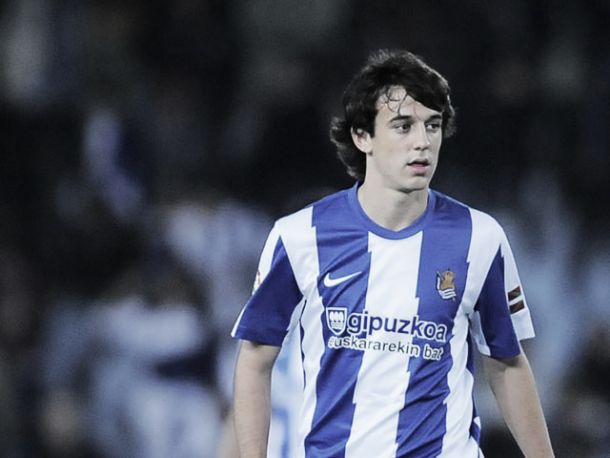A lot has been said about the young prospect from La Real’s ‘Cantera’ (or ‘quarry’ translated literally), Rubén Pardo. He is being touted as a replacement for recently departed Asier Illarramendi, as he can play deep in midfield like the newly-transferred Real Madrid player.
Before we go into specifics, let’s take a look at why such quality players are produced by these ‘quarries’, including but not limited to clubs such as Athletic Bilbao, Sporting de Gijón and most other notable Spanish clubs.
The other ‘Canteras’
There are many Spanish youth systems that have produced fine players; probably the most successful are Real Madrid and Barcelona’s.
However, these youth systems have faltered somewhat of late, this is because youth prospects are being sold off too early. Even at Barcelona, a club famous for youth development, they are starting to fall into a very bad habit similar to that of Real Madrid’s. The transfer of Muniesa to Stoke is a good example of this.
- Pardo has started in midfield already this season.
He is very young, and hasn’t had time to show his potential yet, but since Barca feel they don’t need him (even as a centre-back), they don’t bother renewing his contract. Then there’s the Thiago problem, for which they are now paying the hypothetical price. If it was the Barcelona of old, his clause would never have been ‘triggered’ as it was. Then there’s Real Madrid and their academy. I don’t need to go into the amount of young players that haven’t been treated properly there, mostly to do with the ‘Galactico’ policy. As we can see, these bigger clubs with far more resources than the Basque quarries have far less success with youth players. Why is this?
The success of the Basque ‘Canteras’
The reason the Basque youth players go on to more successful careers on average, is that there are the ‘Basque-only’ or predominantly Basque schemes. What this means is that they have a great chance to get first team playing time at probably the highest level. They are not denied playing time by superstars from abroad, or relegated to the reserves to waste their promising careers. Crucially, though, they are rarely sold (unless they have extreme potential that clubs are willing to pay for) to bigger clubs, where they could be wasted. The players who graduate from these academies are usually attached to the club, for instance it was widely reported that Asier Illarramendi had to be forced away from his club of many years. He was seen crying after the announcement of the transfer to Real Madrid, which he couldn’t say no to. All in all, it’s a pretty foolproof system. Isn’t it?
Why Bilbao’s policy is different
Two famous examples of clubs who have these policies include La Liga sides Athletic Bilbao and Real Sociedad. Most people are aware of Bilbao’s very strict ‘Basque only’ policy when it comes to players (and indeed throughout the club). They will virtually only ever field those who are Basques or have been brought through the youth system from a young age. While it is true that the policy has been relaxed, if you will, of late they are still quite strict. This has advantages, as outlined above, when promoting youth players from the cantera. They gain vital career experience before either possibly becoming club heroes or going elsewhere to further careers (e.g. Javi Martinez, Fernando Llorente).
This was especially noticeable when Marcelo Bielsa, ‘El Loco’, was the manager recently. He played players out of position, (like De Marcos, a midfielder, at left back) most notably the aforementioned Martinez, who he played as a ball playing central defender. This looks like a great move, as it looks like he could play there next season for FC Bayern. However, this policy can mean that the team lacks quality in vital areas and they can’t bring in any foreign talent that would be available at a good price.
Pardo and La Real
This brings us to the latest of La Real’s promising youth players, a certain Rubén Pardo. He plays as a ‘regista’ or a deep lying playmaker most of the time, but he can play in a more advanced role if required. It is his performances in the regista role that have impressed, however. Many now see him as a replacement for Illarramendi, although he does not have the same defensive attributes. He is exceptional at spreading the play, and long lofted balls are his trademark. He is similar to Xavi in many ways, but he has a long way to go to reach that standard admittedly. A more realistic comparison can be made with Oliver Torres of Atletico Madrid and Spain U20, who possesses similar attributes (although it has to be said Torres has these at a much earlier stage).
With the scheme that La Real has in place, there is a heavy emphasis on Basque players and especially Basque youth from the club, just like Bilbao. Unlike them, they bring in a small amount of non-Basques, for instance the likes of Carlos Vela, Claudio Bravo,(however some of these players have graduated through the youth academy despite their nationality).
Pardo in stats and his style of play
The 20 year old made 25 appearances in the 2012/13 La Liga season, with a return of four assists. Seeing as he plays as a regista usually, you shouldn’t pay much attention to the low assist stat. Another thing worth mentioning is that he only made 10 starts; the other 15 were sub appearances. Considering these two points 4 assists is quite a healthy return. He has an excellent pass completion rate, at just over 82%. Compare this to Asier Illarramendi’s, which is below 81%. Now, some would think this is an unfair stat; Illarra has played more games therefore it is harder to keep a high average.
- A typical lineup for the Basque team last season, including Pardo.
This is true, but one must look at the difficulty at the passes both players attempt. Illarra is a good long passer but doesn’t attempt anywhere near as many as Pardo. From this we can conclude that Pardo has an incredible passing range, but he can also pass accurately when it comes to long distance/cross-field balls. He played in the double pivot in Montanier’s 4-2-3-1 system with La Real, which either requires good defensive awareness or exceptional passing/vision. Pardo falls into the latter category. He is usually accompanied by a more defensive player in the pivot to make up for his lack of aerial ability and defensive prowess.
What next for Rubén?
The attributes he possesses at such a young age are outstanding, and that’s based on a season including some brief substitute appearances. He has signed a contract recently that brings him into 2016 with the club, with a reported buyout of €30m. When Bilbao were said to be interested, La Real made it so that if Bilbao alone wanted to trigger the buyout clause it would be double that, at €60m. In other words, he’s tied to Real Sociedad for the foreseeable future at least. This gives him time to develop and earn more caps at international level. He’s certainly one to keep an eye out for.






































